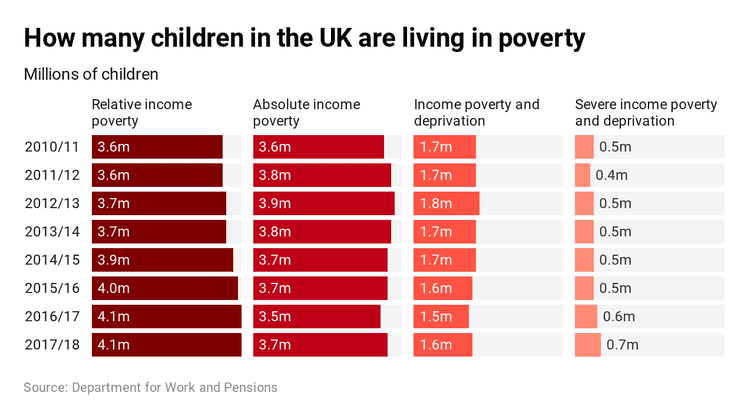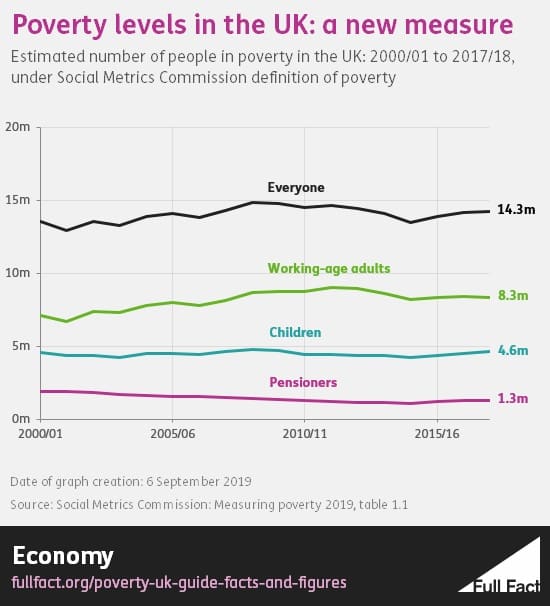In a letter, work and pensions secretary Thérèse Coffey may as well have stuck two fingers up at the poorest children in the UK. Because her dismissal of the concerns of an influential parliamentary committee was staggering.
Another day, another inquiry into the Tories
The Work and Pensions Select Committee has launched an inquiry into child poverty. It states that:
A new wide-ranging inquiry from the Work and Pensions Committee is to examine what steps the Government could take to reduce the numbers of children who grow up in poverty in the UK.
Official figures show that even before the coronavirus pandemic child poverty was a growing issue, affecting more than four million children and impacting on well-being and life prospects.
The initial focus of the Committee will be on the best way to measure child poverty and how the DWP works with other Government departments and local authorities to reduce the number of young people living in poverty.
The inquiry is then expected to examine how well the social security system is working for children, the experiences of families with no recourse to public funds, and support for working parents and separated families.
So far, so good. Because the issue of child poverty is one that desperately needs addressing.
Child poverty: out of control?
In the last decade, child poverty began to rise again – after falling previously. The Conversation summed this up in a graph:

But herein lies the problem. Because the figures above are based on one way of measuring poverty. If you take another method, devised by the Social Metrics Commission, then it’s higher but has remained fairly stable:

You can also measure child poverty by looking at low income households. So, the waters can be muddied around what constitutes child poverty, what doesn’t, and what parameters you’re using. For example, as the Conversation noted, it’s this muddying which allowed Boris Johnson to claim child poverty had fallen – by him using only one measure.
So, the Work and Pensions Select Committee is starting its inquiry by looking into how the government measures child poverty. In advance of this, it wrote to Coffey. And her response was dire, at best.
What, how, and when?
In November 2020, the committee’s chair and Labour MP Stephen Timms, asked Coffey four questions. Some of it was around the government’s plan to look at using the Social Metrics Commission’s definition of child poverty. He wanted to know:
- What steps are you taking to ensure that meaningful progress is made on developing a measure of poverty that could underpin Government policy and strategy, in the way described by Baroness Stroud?
- When do you now expect the first experimental statistics developed using the Social Metrics Commission’s methodology to be published?
- Beyond the publication of the initial statistics, what plans do you have for further work to embed this methodology in Government decision-making? . …
- When do you expect to be in a position to assess whether this measure should be adopted as the Government’s official measure of poverty?
Originally, the government was supposed to publish the first set of experimental statistics on child poverty, based on the commission’s work, last year. But as Timms’ alluded to, that never happened.
Coffey replied in December 2020. And she effectively didn’t even bother to answer Timms’ questions.
The DWP: screw you
You can read the full text of her letter here. But in short, she said that:
we have suspended work that had been agreed with my predecessor on a new poverty metric.
She failed to respond to any of Timms’ questions. Then, Coffey claimed that:
This Government has undertaken considerable thinking and introduced a number of practical interventions to help disadvantaged people during this difficult period.
And she also said:
I maintain the best way to lift people out of poverty is to get them into work.
This is simply not the reality of the situation. The chaos of the free school meals saga is one example; where it took the intervention of a footballer to get the government to back down. Latest GDP figures show a potential “double-dip” recession – so the employment market is not looking promising in 2021. And meanwhile, the government still hasn’t said if it will be keeping the £20 Universal Credit uplift this coming April.
A “stab in the dark”
Timms said that:
The first step to tackling any problem must be to ensure there is a clear picture of the issue. Sadly, the Government has put valuable work on measuring poverty on the back burner. Without agreed measures of poverty, there can be no sensible strategy for tackling it and any policies will be little more than a stab in the dark.
The impact the pandemic has had on child poverty has been huge. So, you’d think now would be the time for the government to fix the measurement chaos. At least 120,000 more children are now in a desperate situation. But Coffey thinks it’s acceptable to effectively shove her fingers in her ears. Yet more shameful conduct from the Conservative government.
Featured image via Sky News – YouTube and Wikimedia
















